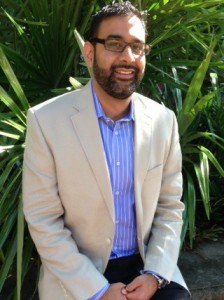Area of specialization: Spirituality in Medicine
Dr. Mustafa Ahmed is an Assistant Professor at the University of Florida College of Medicine. He specializes in advanced heart failure, mechanical circulatory assist and transplantation. He attended the Johns Hopkins University as an undergraduate and obtained his medical degree at West Virginia University School of Medicine. He completed post-graduate medical training at Thomas Jefferson University before coming to the University of Florida for specialty training. Prior to joining faculty at University of Florida, Dr. Ahmed was an Assistant Professor at Temple University School of Medicine.
Dr. Ahmed’s academic interests include cardiac transplantation as well as mechanical circulatory support and artificial hearts. He is particularly interested in examining the health care disparities of underserved individuals within the advanced heart failure population and the complex dynamics between patient, community and physician. In addition to authoring several papers, he has lectured on spirituality in medicine, medical ethics, as well as the physician-patient relationship and care of the Muslim patient.
Dr. Ahmed has a broad experience in the Muslim American community, holding several leadership positions locally. He is the founder and medical director of the RAHMA Mercy Clinic, a non-profit, community initiative dedicated to promoting the well-being of the uninsured.
Current Research Topics
Ventricular Assist Devices and Socioeconomic Status
This project examines the previously unexplored dynamic between advanced heart failure therapeutics and socioeconomic status. To be considered for such therapy, a patient must progress through several layers of referrals with multiple opportunities for disparities to occur. Additionally, it has been demonstrated that patients with lower economic and educational levels are more likely to be readmitted to the hospital following cardiac procedures, regardless of preexisting comorbid conditions. Considering the high readmission rates and potential for disparities in care for patients with left ventricular assist devices, this project seeks to determine if underlying patient factors and attitudes are a determinant in outcomes in this population.
Muslim Physician Attitudes Towards Transplantation
Organ transplantation represents a complex dynamic between patients and the health care system, with faith playing an important, and often neglected part. Islamic bioethical and legal concerns over the rights of the deceased further complicate this issue for Muslim patients and physicians.
In order to better understand potential barriers, and thereby define strategies to improve access to education and care, and as part of a broader project examining the role of faith in medicine, we are hoping to define attitudes of Muslim physicians towards solid organ transplantation.
